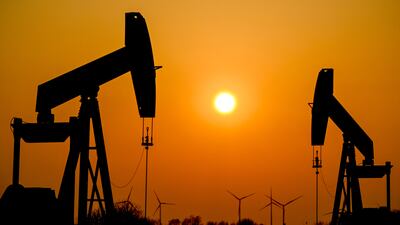The International Energy Agency said its members are ready to release more oil into the market “if needed” to tackle soaring prices in the wake of Russia's military offensive in Ukraine.
Members including the US and its allies are discussing a further co-ordinated release of oil from storage to tackle rising prices, the IEA said in a press conference with US energy secretary Jennifer Granholm in Paris.
IEA member countries committed to releasing 61.7 million barrels of oil reserves as of March 4, exceeding the 60 million barrels of oil that they had pledged to release from emergency stocks to bring stability to energy markets. The US will provide 30 million barrels followed by Japan with 7.5 million, South Korea with 4.4 million, Germany with 3.2 million and the UK with 2.2 million.
“Our member countries and secretariat are closely monitoring the markets and in addition to the initial release, if our member countries decide, we are immediately ready to act and release additional volumes to the market,” IEA Executive Director Fatih Birol said.
He said the earlier release constituted just 4 per cent of the total storage of its member countries, which includes 31 countries. Russia is not a member.
“If our countries decide [that] there is a need, we will be happy to immediately act and bring the volumes to the market.”
Member countries were unanimous that Russian oil and gas imports should be “radically” reduced, he said.
“Different policies, different measures, different timelines but one single target — reducing radically Russian oil and gas imports,” he said.
Oil prices eased slightly following the comments. Brent, the global benchmark for two thirds of the world's oil, dropped 2.15 per cent to trade at $119 a barrel at 7.57pm UAE time on Thursday, while West Texas Intermediate, the gauge that tracks US crude, was trading 1.96 per cent lower at $112.70 a barrel.
Ms Granholm also said there are “ongoing discussions” on the release of emergency stockpiles and “all those tools are certainly on the table”.

US domestic supplies will increase by 1 million barrels per year following calls by President Joe Biden to oil companies to ramp up production to offset Russian imports.
Russia is the world's second-largest energy exporter. It accounts for about 10 per cent of the world’s energy output, including 17 per cent of its natural gas and 12 per cent of its oil. It supplies about 40 per cent of Europe's gas, while Russian crude accounts for about 3 per cent of US oil imports, equal to about 200,000 barrels a day. The US banned Russian oil imports earlier this month, while the EU is considering similar measures.
Mr Birol also stressed on Thursday that countries should not stop fighting climate change due to the current conflict.
“We have to make sure that energy security concerns should be an additional drive to reach our clean energy goals. We shouldn’t be a victim of Russia’s invasion.”


